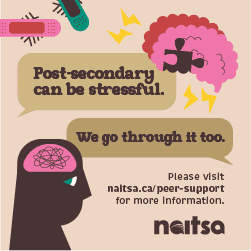This article was previously published in the November 13 print issue. Read it here.
New changes to policies about international studies in Canada have left NAIT needing to accelerate plans to rebalance their international and domestic student population. Announced in early September, Immigration, Refugees and Citizenship Canada (IRCC) said they’ll be reducing the amount of study permits they give out in 2025 and 2026 by 10 per cent—from 485,000 in 2024 to 437,000. This reduction falls in line with their goal to reduce the number of temporary residents in Canada from 6.5 per cent to 5 per cent by 2026.
The most concerning change, said NAIT Vice President Peter Leclaire, is the adjustment of the Post-Graduation Work Permit (PGWP) program. In previous years, once an international student graduated, they could apply for a PGWP and continue working in Canada. However, as of November 1, 2024, students will now only be eligible for a PGWP if they graduate from one of 5 eligible fields of study:
- Agriculture and agri-food
- Health care
- Science, technology, engineering and mathematics
- Trade
- Transport
The fields of study are linked to national labour market needs, but as LeClaire explained, the job landscape looks different in each province. “They painted everybody with the same brush … the work requirements or the employment opportunities in this province look different than what they are in Ontario and BC,” said Leclaire.
Still more clarity needed, says Leclaire
NAIT is currently still seeking additional clarity about which of their programs will fall under the five eligible fields of study, but Leclaire estimated about a third of NAIT’s current offerings will count. However, in this current listing, the business program would not, despite similar programs at universities being eligible.
“Some of the confusion we have is we offer a Bachelor of Business Administration. Our degree program is not eligible, but if you’re at a university, it is eligible.” Leclaire explained. Despite ongoing advocacy seeking for understanding, Leclaire still anticipates major impacts to NAIT’s programs.
“We’re evaluating what that overall impact looks like as we better understand and get confirmation that the eligibility isn’t going to be there,” he said. “So, it’s still to be determined, but it’s going to have a negative impact on us, absolutely.”
For the programs that may now see an increase in international students, Leclaire explained that the focus needs to be on figuring out how to scale effectively. “The biggest piece is it’s not easy to add another section, another intake, simply because of the restrictions in terms of lab accessibility and things like that,” said Leclaire. “One of the things we’re doing right now is we’re going back to our strategic enrollment management plan and saying, ‘Ok, under these circumstances, what does that plan look like now?’”
While NAIT’s plan always was to rebalance the international student population so they “weren’t overly dependent in one particular sector,” the changes to the PGWP has accelerated that need.
“We’re working with facilities, for example, and looking at how do we create capacity within programs … there’s a level of urgency that is there now that we may have had a little bit more flexibility or little more of a runway on it now.”
“Now it’s, yeah, we need to get on that and be a lot more strategic in a shorter period of time.”
Incoming international students can expect a much more competitive landscape when applying to NAIT or other Canadian post-secondary institutions. But Leclaire doesn’t anticipate large increases in tuition, given NAIT still needs to attract students. “It’s already an environment where we’re being challenged to attract the students in based on the narrative coming out of our federal governments … that won’t be well-received if suddenly tuition is doubled,” he explained.
Cover photo: NAIT’s International and Intercultural Community Centre. File photo by Skylar Boissonnault






